Lack of prioritisation and funding for sanitation has led to slow progress in sanitation service delivery in Ghana.
Published on: 03/02/2020
This constraint has consequences for achieving SDG 6.2. The 2017 United Nations statistics reveal that only 14% of Ghana’s population has access to basic sanitation.
Sanitation has been structurally underfunded and less prioritised. To put sanitation on the agenda and encourage local authorities and political leadership to prioritise and invest in sanitation, the Sanitation Challenge for Ghana (SC4Gh), a component of the Ideas to Impact global initiative was initiated.
The initiative was launched on World Toilet Day, 19 November 2015 to stimulate competition among Metropolitan, Municipal and District Assemblies (MMDAs) and to encourage inclusive partnership for the design and implementation of liquid waste management (LWM) strategies.
In 2017 the Ministry of Sanitation and Water Resources launched the Prize for Private Sector and Non-State Actors (PS-NSAs) alongside the SC4Gh to induce the private sector to partner with the competing MMDAs to improve LWM and to influence innovations, expertise and investments in the target localities.
The prize competition ran from November 2015 to July 2019 under the auspices of the Ministry of Sanitation and Water Resources with technical support from IRC Ghana, IMC Worldwide and Maple Consult. The SC4Gh for MMDAs was funded by DFID-UK and the PS-NSAs by the Bill and Melinda Gates Foundation.
At the end of the competition on March 27, 2019, 15 of the 17 MMDAs and 14 of the over 60 registered PS-NSAs submitted their final implementation reports. These were screened and passed to an independent Verification Agent to verify the reports and subsequently to a panel of international and local judges for online and live judging to determine the deserving winners. At the Grand Dignified City Award on July 24, 2019, 9 MMDAs and 6 private partners were announced as winners of a total prize purse of £1,285,000 and US$ 225,000 respectively - for excellence in the implementation of urban liquid waste management strategies.
Results from the initiative provide evidence for local governments and partners to reflect and adapt the innovative approach. Some achievements and innovations of the prize mechanism are captured below:
The prize induced the testing of innovative approaches and technologies resulting in promising solutions for urban liquid waste management to support possible policy uptake and scale-up. These promising urban sanitation solutions included the following:
Trimark’ Aquaculture model with Kumasi Metropolitan Assembly for improved urban sanitation through aquaculture - integrating aquaculture resources into waste treatment facilities where revenue generated from fish production is used to address the chronic lack of funds for maintenance and operation of waste treatment plants.
Outline of Aquaponic system for production of vegetables from treated wastewater
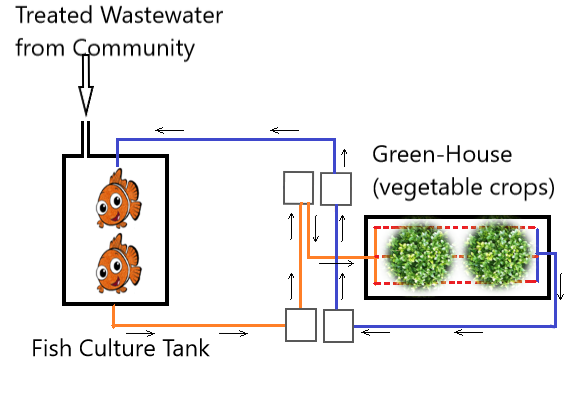
This first winning initiative proposes zero waste to the environment, where the wastewater currently discharged into the environment during the fish production will be channelled into vegetable crop production.
Clean Team container-based sanitation - The Clean Team, a social enterprise based in Kumasi collaborated with Kumasi Metropolitan Assembly to introduce in-home free installed, waterless container-based sanitation within the project target area. The model offered a complete low-cost end-to-end service along the sanitation value chain – from collection (monthly service fee of 43 Cedis, about 50% cheaper than using a public toilet facility) to safe disposal.
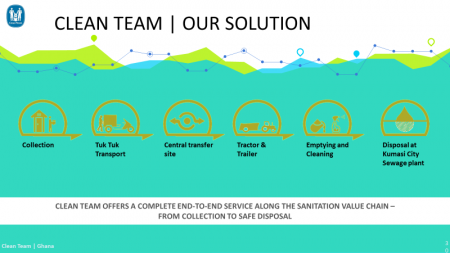
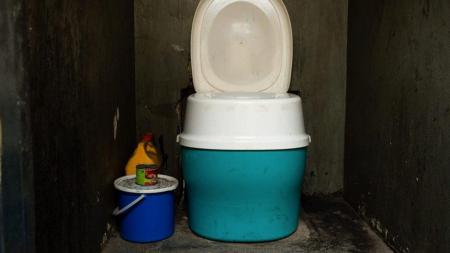
Sanitation for Peace Model: The Nanumba Youth Parliament partnered with the Namumba Municipal Assembly to improve environmental sanitation (liquid waste management) and promote peaceful co-existence among the people of Bimbilla through model parliamentary sittings by the youth of the area to engage community and duty bearers to proffer solutions to the existing sanitation challenges.
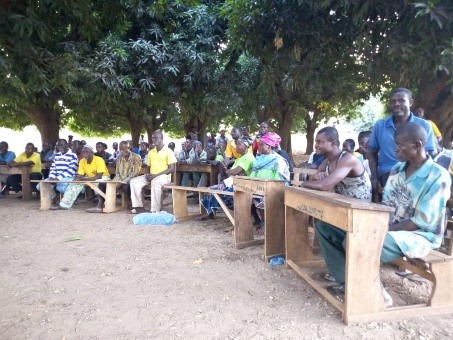
Innovative low-cost resilient lining latrine technology: APDO, a local Ghanaian civil society organisation in partnership with the Nanumba-North Municipal Assembly introduced the innovative low-cost resilient lining latrine technologies (ranges between GH¢218.00 to GH¢650.00 for a sub structure) yet very durable, easy to construct and less labour intensive.
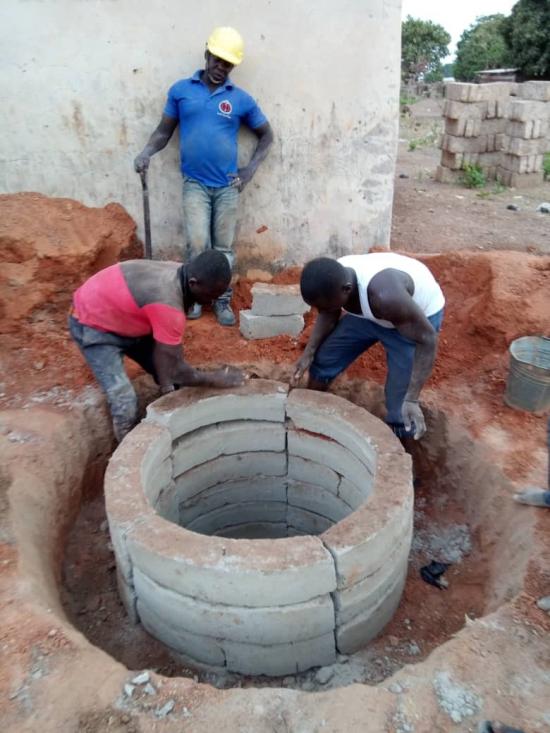
For more on the urban sanitation solutions of the SC4Gh winning initiatives, the brief profiles of the 15 MMDA finalists and their interventions in the management of urban liquid waste using inclusive partnerships, innovative technologies and financing models is available as a booklet in the Resources below.